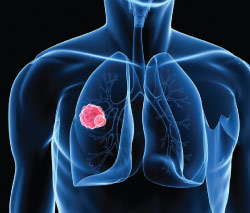Oral Health During Cancer Treatment
Proper Dental Care Can Prevent Severe Side Effects
Dear Doctor,
My father will soon begin treatment for lung cancer. I have heard that cancer treatment can cause a lot of oral health and dental problems. What precautions do you recommend?

Dear Jennifer,
Treatment for any type of cancer — not just oral cancer — can adversely affect the health of the mouth. In fact, more than one third of people treated for cancer develop oral side effects. These problems can be severe enough to affect quality of life and can even interrupt cancer treatment and affect its outcome. But the risk of these complications can be minimized.
Cancer treatments such as chemotherapy and radiation work by attacking cancer cells. However, normal cells, often innocent bystanders, may also be affected. Chemotherapy can thus affect blood cells that develop in the bone marrow thereby reducing resistance to infection. It can also affect the lining tissues of the mouth and the salivary glands. Radiation treatment can affect all tissues in its path. Those undergoing chemotherapy may therefore develop painful mouth sores and dry mouth, which not only make eating and speaking difficult, but also put them at higher risk for dental disease, especially tooth decay.
Chemotherapy may result in short-term side effects until the oral tissues and bone marrow function recover. Radiation therapy has the potential to cause lifelong effects upon healing in the areas exposed to it, contributing to oral health problems when used in the head or neck area.
Prevention is the best approach, making it important to stay on top of your father's oral health from the start.
What The Dentist Can Do
Oral side effects often result when a person's mouth is not healthy prior to cancer treatment. Ensuring dental and oral health should take place as the cancer treatment is being planned and as soon as possible before it starts, so there is adequate recovery time from any necessary dental procedures. Options that include dental surgery should be limited during and following cancer therapy, and are best planned with the oncologist (cancer specialist) and conducted prior to cancer therapy in a manner that promotes rapid healing.
Ensuring dental and oral health should take place as the cancer treatment is being planned and as soon as possible before it starts, so there is adequate recovery time from any necessary dental procedures.
Therefore, the first step in protecting your father's oral health is a complete dental examination to plan treatment with a team of experienced healthcare providers who have an understanding of both cancer therapy and oral health.
Your dentist and doctor should also give your father detailed instructions on caring for his teeth as he undergoes treatment and to recognize signs of oral complications. Using custom-made vinyl mouth trays to apply high-potency fluoride gel will help protect against tooth decay for those at high risk. An antibacterial rinse (containing chlorhexidine or iodine for example) may be recommended before cancer treatment to reduce bacterial contamination of the mouth. If dry mouth does develop, salivary stimulating medications or a saliva substitute may be recommended to help prevent tooth decay and allow your dad to eat comfortably so his nutrition will not be compromised.
What The Patient Can Do
It will be more important than ever for your dad to take good care of his teeth and remove the bacterial biofilm (plaque) that builds up daily, the reason we all should brush and floss. He should particularly brush his teeth gently twice daily with a very soft brush and fluoride toothpaste, and clean between the teeth. In addition to any prescribed rinses, a weak solution of salt and baking soda (one quarter teaspoon of each in a quart of warm water) may be soothing for a sore mouth. He should avoid mouthrinses with alcohol, which may be drying and could cause stinging.
Keeping his mouth moist is essential, so encourage your dad to drink plenty of water; if he finds it helpful, he can also dissolve ice chips in his mouth. Xylitol-containing gum promotes salivation, and xylitol actively prevents tooth decay.
Good nutrition is important to support tissue healing and to maintain health status. He needs adequate energy (calories) and protein intake. Fruits and vegetables provide nutrients and antioxidants. Eliminating or at least reducing tobacco and alcohol are strongly recommended.
What The Family Can Do
Facilitate contact between your father's dentist and his medical team so all parties will be operating with the most complete information, including all prescribed and over-the-counter medications, particularly those that can cause dry mouth. Be sure your dentist knows your father's diagnosis, treatment plan and medical history, and the contact information for his treating physicians.
Throughout treatment, remain vigilant for signs of oral discomfort from the teeth, jaws, and lining of the mouth such as dry mouth, or changes in taste, and notify your oncologist and dentist if your father experiences any side effects involving the mouth. With the help of a knowledgeable dental professional integrated into the cancer team and family support, you can make sure your father is as comfortable and fit for treatment as possible, with the best possible outcomes.

